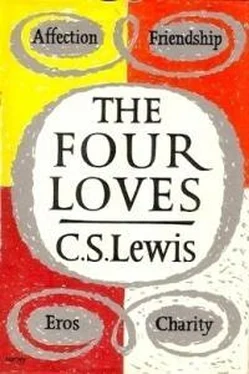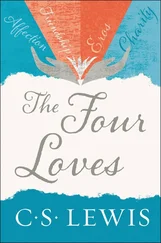For indeed we require this relief. The poetry is there as well as the un–poetry; the gravity of Venus as well as her levity, the gravis ardor or burning weight of desire. Pleasure, pushed to its extreme, shatters us like pain. The longing for a union which only the flesh can mediate while the flesh, our mutually excluding bodies, renders it forever unattainable, can have the grandeur of a metaphysical pursuit. Amorousness as well as grief can bring tears to the eyes. But Venus does not always come thus "entire, fastened to her prey", and the fact that she sometimes does so is the very reason for preserving always a hint of playfulness in our attitude to her. When natural things look most divine, the demoniac is just round the corner.
This refusal to be quite immersed—this recollection of the levity even when, for the moment, only the gravity is displayed—is especially relevant to a certain attitude which Venus, in her intensity, evokes from most (I believe, not all) pairs of lovers. This act can invite the man to an extreme, though short–lived, masterfulness, to the dominance of a conqueror or a captor, and the woman to a correspondingly extreme abjection and surrender. Hence the roughness, even fierceness, of some erotic play; the "lover's pinch which hurts and is desired". How should a sane couple think of this? or a Christian couple permit it?
I think it is harmless and wholesome on one condition. We must recognise that we have here to do with what I called "the Pagan sacrament" in sex. In Friendship, as we noticed, each participant stands for precisely himself—the contingent individual he is. But in the act of love we are not merely ourselves. We are also representatives. It is here no impoverishment but an enrichment to be aware that forces older and less personal than we work through us. In us all the masculinity and femininity of the world, all that is assailant and responsive, are momentarily focused. The man does play the Sky–Father and the woman the Earth–Mother; he does play Form, and she Matter. But we must give full value to the word play . Of course neither "plays a part" in the sense of being a hypocrite. But each plays a part or role in—well, in something which is comparable to a mystery–play or ritual (at one extreme) and to a masque or even a charade (at the other).
A woman who accepted as literally her own this extreme self–surrender would be an idolatress offering to a man what belongs only to God. And a man would have to be the coxcomb of all coxcombs, and indeed a blasphemer, if he arrogated to himself, as the mere person he is, the sort of sovereignty to which Venus for a moment exalts him. But what cannot lawfully be yielded or claimed can be lawfully enacted. Outside this ritual or drama he and she are two immortal souls, two free–born adults, two citizens. We should be much mistaken if we supposed that those marriages where this mastery is most asserted and acknowledged in the act of Venus were those where the husband is most likely to be dominant in the married life as a whole; the reverse is perhaps more probable. But within the rite or drama they become a god and goddess between whom there is no equality—whose relations are asymmetrical.
Some will think it strange I should find an element of ritual or masquerade in that action which is often regarded as the most real, the most unmasked and sheerly genuine, we ever do. Are we not our true selves when naked? In a sense, no. The word naked was originally a past participle; the naked man was the man who had undergone a process of naking , that is, of stripping or peeling (you used the verb of nuts and fruit). Time out of mind the naked man has seemed to our ancestors not the natural but the abnormal man; not the man who has abstained from dressing but the man who has been for some reason undressed. And it is a simple fact—anyone can observe it at a men's bathing place—that nudity emphasises common humanity and soft–pedals what is individual. In that way we are "more ourselves" when clothed. By nudity the lovers cease to be solely John and Mary; the universal He and She are emphasised. You could almost say they put on nakedness as a ceremonial robe—or as the costume for a charade. For we must still beware—and never more than when we thus partake of the Pagan sacrament in our love–passages—of being serious in the wrong way. The Sky–Father himself is only a Pagan dream of One far greater than Zeus and far more masculine than the male. And a mortal man is not even the Sky–Father, and cannot really wear his crown. Only a copy of it, done in tinselled paper. I do not call it this in contempt. I like ritual; I like private theatricals; I even like charades. Paper crowns have their legitimate, and (in the proper context) their serious, uses. They are not in the last resort much flimsier ("if imagination mend them") than all earthly dignities.
But I dare not mention this Pagan sacrament without turning aside to guard against any danger of confusing it with an incomparably higher mystery. As nature crowns man in that brief action, so the Christian law has crowned him in the permanent relationship of marriage, bestowing—or should I say, inflicting?—a certain "headship" on him. This is a very different coronation. And as we could easily take the natural mystery too seriously, so we might take the Christian mystery not seriously enough. Christian writers (notably Milton) have sometimes spoken of the husband's headship with a complacency to make the blood run cold. We must go back to our Bibles. The husband is the head of the wife just in so far as he is to her what Christ is to the Church. He is to love her as Christ loved the Church—read on— and gave his life for her ( Eph. V, 25). This headship, then, is most fully embodied not in the husband we should all wish to be but in him whose marriage is most like a crucifixion; whose wife receives most and gives least, is most unworthy of him, is—in her own mere nature—least lovable. For the Church has no beauty but what the Bridegroom gives her; he does not find, but makes her, lovely. The chrism of this terrible coronation is to be seen not in the joys of any man's marriage but in its sorrows, in the sickness and sufferings of a good wife or the faults of a bad one, in his unwearying (never paraded) care or his inexhaustible forgiveness: forgiveness, not acquiescence. As Christ sees in the flawed, proud, fanatical or lukewarm Church on earth that Bride who will one day be without spot or wrinkle, and labours to produce the latter, so the husband whose headship is Christ–like (and he is allowed no other sort) never despairs. He is a King Cophetua who after twenty years still hopes that the beggar–girl will one day learn to speak the truth and wash behind her ears.
To say this is not to say that there is any virtue or wisdom in making a marriage that involves such misery. There is no wisdom or virtue in seeking unnecessary martyrdom or deliberately courting persecution; yet it is, none the less, the persecuted or martyred Christian in whom the pattern of the Master is most unambiguously realised. So, in these terrible marriages, once they have come about, the "headship" of the husband, if only he can sustain it, is most Christ–like.
The sternest feminist need not grudge my sex the crown offered to it either in the Pagan or in the Christian mystery. For the one is of paper and the other of thorns. The real danger is not that husbands may grasp the latter too eagerly; but that they will allow or compel their wives to usurp it.
From Venus, the carnal ingredient within Eros, I now turn to Eros as a whole. Here we shall see the same pattern repeated. As Venus within Eros does not really aim at pleasure, so Eros does not aim at happiness. We may think he does, but when he is brought to the test it proves otherwise. Everyone knows that it is useless to try to separate lovers by proving to them that their marriage will be an unhappy one. This is not only because they will disbelieve you. They usually will, no doubt. But even if they believed, they would not be dissuaded. For it is the very mark of Eros that when he is in us we had rather share unhappiness with the Beloved than be happy on any other terms. Even if the two lovers are mature and experienced people who know that broken hearts heal in the end and can clearly foresee that, if they once steeled themselves to go through the present agony of parting, they would almost certainly be happier ten years hence than marriage is at all likely to make them—even then, they would not part. To Eros all these calculations are irrelevant—just as the coolly brutal judgment of Lucretius is irrelevant to Venus. Even when it becomes clear beyond all evasion that marriage with the Beloved cannot possibly lead to happiness—when it cannot even profess to offer any other life than that of tending an incurable invalid, of hopeless poverty, of exile, or of disgrace—Eros never hesitates to say, "Better this than parting. Better to be miserable with her than happy without her. Let our hearts break provided they break together." If the voice within us does not say this, it is not the voice of Eros.
Читать дальше











